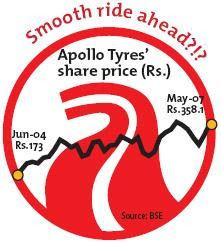Lack of major discoveries have resulted in stagnating growth
IIPM PUBLICATION
Corporate
 India should be rejoicing that policy makers are doing so much for oil security. Or should they? Are these steps interlinked parts of an integrated strategy? Or are these ad hoc, piece meal efforts for which policy makers in India have acquired a degree of notoriety?
India should be rejoicing that policy makers are doing so much for oil security. Or should they? Are these steps interlinked parts of an integrated strategy? Or are these ad hoc, piece meal efforts for which policy makers in India have acquired a degree of notoriety?There is a need to develop a coherent policy for India’s long term energy security. Oil becomes important and controversial because India doesn’t produce enough of it and has to rely on imports. India did not have a typical oil crisis either during the oil shocks of 1973 and 1979, or during the Iraq-Kuwait conflict in 1990-91. Because of the existence of the price control regime, the corollary of the crisis, namely availability of dollars to pay for oil imports, has been more troubling than probably internal fluctuations in demand of oil. Yet, when one extrapolates the demand for oil imports that would be required to sustain India on a high growth path, the figures look staggering. If the current rates of growth are sustained, the demand for oil imports by 2020 would have gone up to about 250 million tonnes. Assuming a price of $40 per barrel, the country’s import bill could be around $100 billion. At $60 a barrel, the figure would be $150 billion.
This is presuming that West Asia remains stable and the oil supplies from there are not disrupted. According to Al Ahji, senior advisor, OPEC, even though these high prices cannot be sustained, the best way out for India is to become a stakeholder in oil exploration projects in countries that have the reserves. If OVL is already doing that in Vietnam, Sudan, Algeria and Iran, various other public sector oil companies have been figuring out ways of tying up with upstream oil suppliers in exporting countries to secure long term supplies. Yet, there still appears to be no coherent long term vision at the top. One day, one hears about an LNG pipeline from Oman to India running through the Arabian Sea. The next, one hears about a pipeline from Iran to India running through Pakistan. Yet another day, one further hears of oil and gas pipelines snaking their way from Central Asia through Afghanistan and Pakistan to India. Oil industry analysts have been hearing about these schemes for the last 15 years. The truth is: not a single project has taken off so far.
According to analysts, even if there were peace with Pakistan in the long run, it will be virtually a decade before a pipeline driven system of oil and gas supplies through Central and West Asia can be set up. There are analysts who see India’s ventures in countries like Sudan and Algeria being on shaky ground. According to political and strategic analyst Saeed Naqvi, “USA has a nasty habit of mentoring civil war like situations in countries that are hostile to US oil firms”. Can Manmohan Singh clear the air on this during his Washington visit?
For Complete IIPM Article, Click on IIPM Article
Source : IIPM Editorial, 2007
An IIPM and Professor Arindam Chaudhuri (Renowned Management Guru and Economist) Initiative
For More IIPM Article, Visit Below....
! Management School ! IIPM Delhi ! IIPM.com ! IIPM Top MBA Institute ! IIPM Faculty !
Labels: Business and Economy, DR MALAY CHAUDHURI, IIPM, IIPM BEST MBA INSTITUTE, IIPM BUSINESS MANAGEMENT SCHOOL, Post Graduate Courses, Professor Arindam Chaudhuri, Renowned Management Guru and Economist
Rashmi Bansal Publisher of JAMMAG magazine caught red-handed, for details click on the following links.










